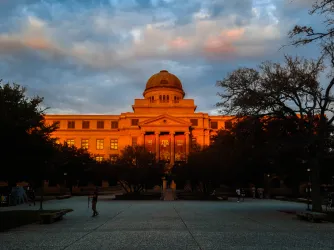Table of Contents
Folding under pressure, University of California San Diego suspends professor for protected comments

Ken Wolter / Shutterstock.com
University of California, San Diego, suspended a chemistry professor for in-class comments about the Latino and Chicano communities.
A viral video showing a UCSD chemistry professor’s offhand comments in class, about Latino and Chicano custodial workers he thought were being too loud, have led to his suspension.
On Oct. 14, a UCSD student posted the video showing professor Robert Ternansky shouting to custodial workers down a hallway: “Sí, sí, señor. Ándale, ándale! Arriba, arriba!” then asking his class, “How do you say ‘quiet’ in Mexican? Cállate?” After a quick discussion of Ternansky’s limited knowledge of Spanish, he referenced the workers again: “Someone tell me if they start running in here with weapons.”
Students and faculty flooded the Instagram comments criticizing what Ternansky said, and calling for UCSD’s administration to act. Some demanded that USCS suspend Ternansky, while others insisted he be terminated.
Learning how to respond to unfavorable opinions is an important part of civil discourse and improves students’ ability to think critically.
Even though Ternansky issued an apology, by Oct. 18 UCSD had removed him from teaching his assigned courses for the remainder of the fall quarter.
In a statement announcing the effective suspension, Dean of UCSD’s Physical Sciences Division, Steven Boggs, told Inside Higher Ed that the incident was “a painful reminder of how offhand comments and ‘jokes’ can expose biases and stereotypes which are antithetical to our ongoing efforts to create an inclusive and respectful environment for everyone.” He added that Ternansky’s removal was necessary “to ensure a ‘productive learning environment for all.’”
There’s just one big problem: Ternansky’s suspension violates his First Amendment right to freedom of speech. As a public university, UCSD has an obligation to comply with the First Amendment — whether it comes to institutional policies or the pursuit of disciplinary action. While people on and off UCSD’s campus were offended by Ternansky’s comments, the First Amendment doesn’t restrict speech just because some — or even many — take offense to it. In fact, the First Amendment exists precisely to protect this kind of controversial speech.
If UCSD can punish a faculty member if someone finds their protected speech subjectively offensive, faculty will reasonably begin to self-censor.
That is exactly what FIRE explained in its letter to UCSD on Oct. 28. Unless Ternansky’s comments fit one of the definitions for a category of unprotected speech, UCSD doesn’t have the authority to punish him for it. We also noted this principle doesn’t insulate Ternansky from criticism, as people on and off campus are free to use their own expressive rights to express their feelings about what they said. But UCSD, as a government entity, may not subject controversial speech to institutional punishment.
As we told UCSD, Ternansky’s suspension will have a ripple effect on other UCSD faculty members. If UCSD can punish a faculty member if someone finds their protected speech subjectively offensive, faculty will reasonably begin to self-censor. That’s a net loss for higher education, where students must learn, not just from pre-planned lectures and materials, but from engaging with the authentic opinions and experiences of others. Learning how to respond to unfavorable opinions is an important part of civil discourse and improves students’ ability to think critically. By suspending Ternansky, UCSD is depriving its students of this valuable lesson while violating a professor’s constitutional rights in the process.
FIRE defends the rights of students and faculty members — no matter their views — at public and private universities and colleges in the United States. If you are a student or a faculty member facing investigation or punishment for your speech, submit your case to FIRE today. If you’re faculty member at a public college or university, call the Faculty Legal Defense Fund 24-hour hotline at 254-500-FLDF (3533).
Recent Articles
Get the latest free speech news and analysis from FIRE.

The American people fact-checked their government

Facing mass protests, Iran relies on familiar tools of state violence and internet blackouts

Unsealed records reveal officials targeted Khalil, Ozturk, Mahdawi solely for protected speech


